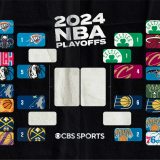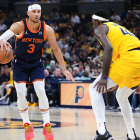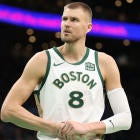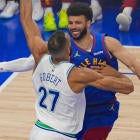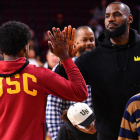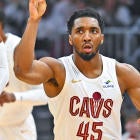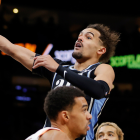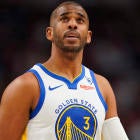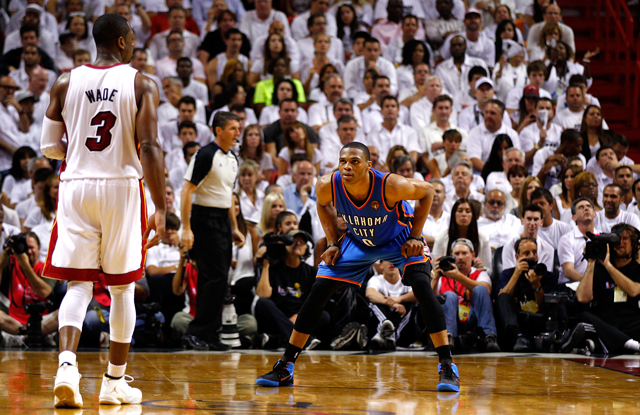 |
| Dwyane Wade and Russell Westbrook faced off in the 2012 NBA Finals. Both landed in the Elite 100's top 10. (Getty Images) |
Last year we ranked the Elite 100 players in the NBA. Our crew of three, which watches every team on a regular basis throughout the season, evaluated the players using all the criteria we could -- past performance, recent production, injuries, projected improvement, character isssues, decision-making, basketball IQ, advanced metrics, team fit -- everything.
The rankings are prepared by the three bloggers for Eye on Basketball: Royce Young, Ben Golliver and Matt Moore. The rankings are averaged and listed here in random order. Last year's rankings are in parentheses.
Earlier, we unveiled No. 100 through No. 50 and then No. 49 through No. 40, No. 39 through No. 30, No. 29 through No. 20 and No. 19 through No. 11. Check out the guys who fell out of the top 100 between 2011 and 2012 here. The following is No. 10 through No. 6.
No. 10: Dirk Nowitzki, PF, Age 34, Dallas Mavericks (2011 ranking: 3)
2012 Stats: 21.6 ppg, 6.8 rpg, 3.7 rpg, 2.2 apg, 45.7 FG%, 21.7 PER
Rankings: 9, 10, 15
After conquering a decade of doubts and reaching the NBA's highest summit by winning the 2011 NBA Finals, Dallas Mavericks forward Dirk Nowitzki decided to give himself the equivalent of a season-long sabbatical last year. Enjoying his lockout-long victory parade a bit too much, Nowitzki got off to a slow start, scoring above 20 points just once in the 12 games he played between Jan. 5 and Feb. 3. He was briefly shut down so that he could tend to a bothersome knee and, reportedly, so that he could work himself into better shape.
The effort to pull his season back together was mostly successful, but it had a fruitless feeling from the start. Mavericks owner Mark Cuban's decision to let center Tyson Chandler leave for the New York Knicks via free agency left Dallas without its best defensive player and a key Nowitzki protector. The team's only meaningful new addition, Lamar Odom, turned out to be a total bust. The Mavericks qualified for the playoffs as the No. 7 seed but were swept by the Oklahoma City Thunder. Dallas, to its credit, did put up a fight, with Nowitzki topping 30 points twice during the series.
Nowitzki's final stats wound up looking pretty similar to his 2011 numbers, except when it came to his shooting. After posting a career-high 51.7 percent during the Mavericks' championship year, Nowitzki slipped back to 45.7 percent in 2011-12, the lowest mark since his rookie season in 1998-99. Part of the problem: he attempted an extra 3-pointer every night, to the tune of 3.4 treys per game, the most he'd put up in nearly a decade. Add the fact that he got to the free throw line fewer than six times per game for the first time since 2003-04, and Nowitzki simply wasn't the same offensive efficiency monster that he was in 2010-11.
With a revamped (read: younger) roster around him and the Thunder and Los Angeles Lakers dominating all headlines in the Western Conference, Nowitzki, who has $43.6 million over two years left on his contract, finds himself back in the shadows. That could turn out to be a comfortable place. If he turns up re-dedicated this season, there's nothing stopping the Mavericks from pushing the San Antonio Spurs a bit in the Southwest Division. But the lesson learned in 2012 will hold true in 2013; a less-than-100 percent Nowitzki might be good enough to get the Mavericks to qualify for the postseason, but vintage Dirk will be needed once it's playoff time.
No. 9: Derrick Rose, PG, Age 23, Chicago Bulls (2011 ranking: 5)
2012 Stats: 21.8 ppg, 3.4 rpg, 7.9 apg, 43.5 FG%, 23.0 PER
Rankings: 7, 12, 9
There's no tougher player to rank in this format than Chicago Bulls point guard Derrick Rose, for obvious and terribly sad reasons. If healthy, Rose would be in the conversation for the second- or third-best basketball player on the planet. Instead of leading another fierce Bulls playoff push, though, he spent the early summer undergoing surgery on a torn ACL. It's difficult to imagine a player enjoying more universal support during a rehabilitation than Rose; that feeling only grew deeper when he broke down in tears on stage during a sneaker launch event last week.
The "Where does he rank now?" question is virtually impossible and, considering the circumstances, it's not particularly fair. Do you judge him by what he was when healthy last season? By what you think he will be once he returns to the court next year?
The facts: his numbers were down from his 2011 MVP campaign, and the Rose-less Bulls were eliminated two rounds earlier in 2012 compared to their 2011 Eastern Conference finals trip. Rose missed nearly half of the season because of various ailments, and the Bulls, who finished with the East's best record, still managed to go 18-9 in his absence. He had to drop in these rankings. The only question was: how far?
Here, the Eye On Basketball panel seemed to place him with a certain respect factor, as Rose fell just four spots despite his absences, the Bulls' sudden postseason ending and the long-term rehabilitation that he still faces. The genesis of that respect isn't difficult to comprehend: Rose, a hometown hero, is a respected leader, a determined competitor, a no-nonsense adult (remember, he didn't dance like a doofus during All-Star Game introductions) and, above all, a supremely talented player.
It's fair to worry that the knee surgery might rob Rose of some of his explosiveness, his strength off the dribble or his quickness. But it's also fair to trust, as many do, that Rose will bounce back into his place among the league's truly elite players through willpower and hard work. In December, the Bulls and Rose came to a quick agreement on a five-year max contract worth $94 million that kicks in this season. That deal removes a lot of the stress and urgency. As much as he surely wants to return to the court and as much as everyone wants to see him back, it's absolutely critical to remember there is no rush here. There are plenty of basketball games left for Rose to win over the next decade.
No. 8: Kevin Love, PF, Age 24, Minnesota Timberwolves (18)
2012 Stats: 26.0 ppg, 13.3 rpg, 2.0 apg, 44.8 FG%, 37.2 3P%. 25.4 PER
Rankings: 5, 10, 8
Minnesota Timberwolves forward Kevin Love is the highest-ranked player on this list never to have reached the playoffs. Indeed, six of the seven players above him (everyone except Los Angeles Clippers guard Chris Paul) have reached the NBA Finals and three of those six are ring bearers. So what puts Love in this elite company?
It starts with the rebounding, of course. He's either the first- or second-best overall rebounder in the game (depending on how you feel about Dwight Howard), and he's the best offensive rebounder. But the development last season that helped launch Love into MVP contention was his transformed body and improved overall offensive game. Shedding weight and improving his quickness, Love was used all over the court by new coach Rick Adelman, who replaced Kurt Rambis. Encouraged to bomb away from deep, Love attempted more than five 3-pointers a game, knocking down 37.2 percent. Those are astonishing numbers for a 6-foot-10 player best known previously for banging in the paint. But Love didn't go soft here. Instead, he got to the free throw line a career-high 8.4 times per game, good for second in the league behind Howard. The difference: Love knocked down 82.4 percent of his shots compared to Howard's 49.1 percent, making him a late-game weapon from the stripe rather than a Hack-a-Love liability.
Love was an absolute wrecking ball in March. The stat lines are jaw-dropping. Fifty-one points and 14 rebounds against the Oklahoma City Thunder in overtime on March 21. Two nights later, 30 points and 21 rebounds against the Denver Nuggets . Two nights after that, 28 points and 11 rebounds against the Memphis Grizzlies . The very next night, 40 points and 19 rebounds against the Charlotte Bobcats . In six days, he put together what many professionals would consider a good month. During the stretch, Love never really blinked. He was too busy doing his job and trying to get his team into the playoffs.
Unfortunately, the loss of star point guard Ricky Rubio to ACL surgery eventually made the burden on Love too much to bear. The Timberwolves faded badly down the stretch, losing seven straight games before Love was shut down in April. Still, it remained the most productive and positive season of his four-year career. Adelman was the right coach, Rubio was the right point guard and the Timberwolves had a reasonable core to build around. The team's summer only offers additional hope, thanks to the signings of Andrei Kirilenko and Brandon Roy. Barring a ridiculously long rehabilitation for Rubio, Minnesota is set up to be a solid playoff team in 2012-13.
Throw in a gold medal at the 2012 London Olympics, and you would think this was a drama-free year for Love. You wouldn't be totally wrong, but you wouldn't necessarily be right, either. His relationship with team president David Kahn has always seemed frosty, and Love wasn't offered a full five-year maximum contract extension, the type of deal that was given to other stars in his class, like Chicago Bulls guard Derrick Rose and Oklahoma City Thunder guard Russell Westbrook. Instead, Love signed a four-year contract that includes a player option for the final season, meaning he can be an unrestricted free agent in July 2015. What were the Timberwolves thinking? There is no logical answer to that question. The key for now in Minnesota is to enjoy every second of the next three seasons.
No. 7: Dwyane Wade, SG, Age 30, Miami Heat (4)
2012 Stats: 22.1 ppg, 4.8 rpg, 4.6 apg, 1.7 spg, 1.3 bpg, 49.7 FG%, 26.3 PER
Rankings: 12, 7, 4
How does a megastar like Miami Heat guard Dwyane Wade win the second title of his career and drop three spots in these rankings? That's a difficult question, and if anyone in the top 10 has a legitimate beef at being underrated, it's probably Wade.
There are two relatively easy answers here. First, Wade missed a quarter of the regular season because of various injuries and was less than 100 percent during key stretches of the playoffs, particularly during the Eastern Conference semifinals against the Indiana Pacers, when he had to have his knee drained. Second, 2012 was the year in which LeBron James smashed to pieces the question of who was the Heat's so-called "Alpha Dog." After sharing leadership responsibilities with James during the 2010-11 season, the first year of the "Big 3," Wade faded back ever so slightly this season, as James jumped onto center stage and never looked back.
What you get from Wade, when healthy, is still a remarkably lethal cocktail of athleticism, basketball intelligence and high-level skill. He stuffs the stat sheet on defense, creating lots of open-court opportunities with his quick hands and off-ball instincts. Offensively, he can create a shot in multiple ways against any defender in the league and can, literally, spin his defenders around in circles with his jukes and fakes.
In 2012, though, Wade, who played the fewest minutes per game of his career, simply did less on offense, averaging 22.1 points and taking just 17.1 shots per game, the lowest marks in each category since his rookie season. The good news: he also shot significantly fewer threes, never really his strong suit. The bad news: he wasn't on the free throw line as much (6.1 in 2012, down from 8.6 in 2011), although James did just fine at the line and Wade was still among the league leaders in the category. Despite Wade's statistical decline, Miami remained among the league leaders in offensive efficiency.
Given Miami's postseason success and James' reign of terror, the Heat's transition from a two-headed monster into a LeBron-led brigade couldn't have gone more smoothly. Aside from a minor spat with coach Erik Spoelstra during the Pacers series, Wade seemed at ease all season. If he ever had a problem with his shifting role, it didn't show. Really, he seems to be loving life, making the talk show circuit to promote his new book on fatherhood and using his summer to rest following a minor procedure on his knee rather than compete in the London Olympics.
With his second ring and James' "The Decision" firmly in the rearview, Wade likely feels more settled now than he has at any point in years. Like both James and Chris Bosh, Wade still has two full seasons to play before he needs to worry about any contractual issues. Assuming things continue according to plan, he could simply pick up his player options in both 2014-15 and 2015-16, putting off the need to make any life decisions until he is 34 years old. Until then, it's time for Wade and the Heat to keep working to fulfill the ambitious, albeit foolish, "not one, not two, not three" championships prediction that James made in 2010. For Wade, fully secure as a No. 2 guy, this is legacy-building time.
No. 6: Russell Westbrook, PG, Age 23, Oklahoma City Thunder (14)
2012 Stats: 23.6 ppg, 4.6 rpg, 5.5 apg, 1.7 spg, 45.7 FG%, 22.9 PER
Rankings: 3, 7, 8
Is this too high for Oklahoma City Thunder guard Russell Westbrook? A case of "too much, too soon" for a 23-year-old with a high turnover rate and occasional problems controlling his temper? The case against Westbrook got harder, if not impossible, to make in 2011-12, as he helped propel a young and dangerous Thunder team all the way to the Finals.
Was it "too much too soon" when he put up 29 points and 28 points to place the defending champion Mavericks in an 0-2 hole from which they wouldn't escape? Was it "too much too soon" when the Lakers had absolutely no way to defend him, especially when he went off for 37 points in a ferocious Game 4? Was it "too much too soon" when he kept his wits about him against the Spurs, fighting out of an 0-2 deficit to score 23 points, dish 12 assists, grab four rebounds and snare four steals in a decisive Game 5 victory? Was it "too much too soon" when he valiantly put it all on the line against the Heat in the Finals, putting up 43 points, seven rebounds and five assists in a Game 4 loss that sealed his team's fate?
No, it wasn't. Westbrook rendered the "too much too soon?" question moot this year, transforming himself from an easy scapegoat in 2011 into an often unguardable phenomenon with an improved feel for the game and the composure to deliver wins (or the smarts to get out of Kevin Durant's way) in key playoff moments. Importantly, Westbrook did it his way: goofy shirts, stupid eyeglasses, no apologies and plenty of highlights. As his sense of fashion and unchecked confidence helped catapult him into superstardom in the broader pop cultural sense, Westbrook made a few improvements to his game that paid nice dividends.
The biggest: a better mid-range jump shot that forced defenses to play him more honestly. Per Hoopdata.com, Westbrook improved his shooting from 16-23 feet from 36 percent in 2011 to 43 percent in 2012. That was the key factor behind his career-high 45.7 percent from the floor, and it left opponents with no outs. They already couldn't pressure him on the dribble, and they preferred to go under high screens because of his quickness. Now, finally, he could make them pay for even the slightest amount of space. Then what? Guarding him one-on-one became a matter of pick your poison with no remaining antidote.
Then there was a less numerical but equally key development: Westbrook honed his ability to manage a close game. The best example: his unforgettable circus shot in transition that buried the Lakers. He seized that moment on pure instinct, created his own good luck, and sucked the wind out of his opponent's sails. Equally key were other moments when he checked his ego at the door and let Durant, probably the game's best big shot maker, take the controls on game-deciding possessions. In 2012, the Thunder made big strides in their execution down the stretch compared to 2011, and the player who bore the brunt of the criticism then deserves his share of acclaim, for his own actions and the team's success, now.
Finally, Westbrook continues to prove that he's unbelievably durable. Through four seasons, he hasn't missed a single game because of injury (or any other reason). He's working on a 312-game ironman streak, and he doesn't turn 24 years old until November. There's being good, there's being great, and then there's being great every single night. Westbrook is one of the rare players who has existed exclusively in that final category. What's more, he didn't bother to use the summer to rest. Just weeks after the Thunder's season ended, he was already training with USA Basketball, on his way to the first Olympic gold medal of his career. His reliability and love for the game are easy to overlook thanks to his thunderous dunks and silly post-game press conferences. But, along with everything else, those attributes helped make a five-year maximum contract worth $78.6 million an absolute no-brainer for Oklahoma City last December.
Westbrook's meteoric rise is best explained this way: He's the last person in the world to wonder, "Is this too much too soon?" because he's far too busy asking, "When will I reach the top?"








